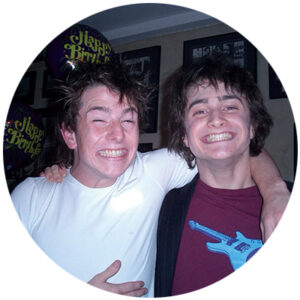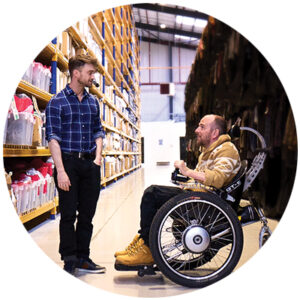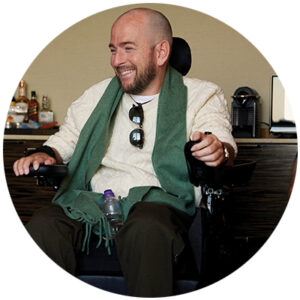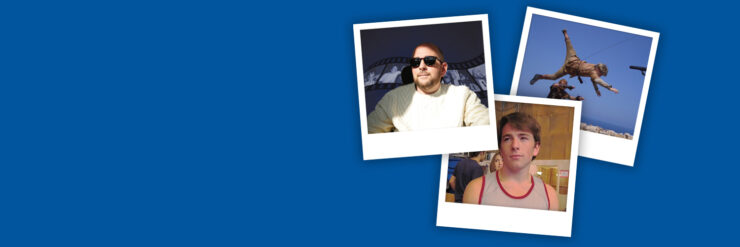“Hope is the first thing you should look for and the last thing you should let go of,” he says. “You can either focus on the negative or be thankful for the positive.” David chooses to be thankful.
It is a choice that can require a lot of thought, reframing and acceptance. This didn’t come easily when he was first injured. His life and everything he’d been able to do before was changed in a split second. He knew what it was like to fly, and now he could no longer walk.
 At a young age, David knew what he wanted to be: a stuntman. At 14, he got his chance when a stunt coordinator took the young gymnast under his wing and gave him his first job. Like many kids dreamed, David was in the movies. Then, at 17, he got the job of a lifetime as a professional stuntman and stunt double for Daniel Radcliffe in the Harry Potter films. He worked on the films for eight years and built strong friendships with the cast and crew. Then, one day, a stunt went wrong that resulted in a broken neck. Further complications from a spinal cyst that developed later mean that David has quadriplegia at the C4 level but has continued neurological decline. “Spinal cord injury is the gift that keeps on taking,” he says with a smile.
At a young age, David knew what he wanted to be: a stuntman. At 14, he got his chance when a stunt coordinator took the young gymnast under his wing and gave him his first job. Like many kids dreamed, David was in the movies. Then, at 17, he got the job of a lifetime as a professional stuntman and stunt double for Daniel Radcliffe in the Harry Potter films. He worked on the films for eight years and built strong friendships with the cast and crew. Then, one day, a stunt went wrong that resulted in a broken neck. Further complications from a spinal cyst that developed later mean that David has quadriplegia at the C4 level but has continued neurological decline. “Spinal cord injury is the gift that keeps on taking,” he says with a smile.
As a young man, he had to learn and accept a new way of life. Now, 15 years later, his story is being told in the documentary David Holmes: The Boy Who Lived. Co-produced with his friend Daniel Radcliffe, the film shows behind-the-scenes footage, home movies and interviews with David’s network of friends, family, and colleagues. It shows a cheeky young man who loved the adrenaline rush of the physical stunts, and you see that same spirit in David now. While he may not be performing stunts, his desire to fly hasn’t left him. Travelling, racing adaptive cars, and finding ways to help people with disabilities who are less fortunate than him take up his time now. He even has an upcoming photo shoot for the National Portrait Gallery in the U.K., where he plans to sit in his chair with his head on fire. Ever the stuntman, a basic smiling portrait won’t do.
 Empathy is a bridge between compassion
Empathy is a bridge between compassion
and understanding.
However, it’s not all smiles. Like many with spinal cord injury, David lives with constant pain. Mindfulness and breath control help him with pain management and well-being, as well as staving off the complications that come with his neurological deterioration. He takes comfort in the things that haven’t changed, like his sense of humour and love of movies. He can still enjoy watching movies even if he knows the inner workings of those incredible stunts. Their magic is not lost on him, and he appreciates that his accident has led to improvements that no one else will do the stunt that led to his injury.
 One film he hasn’t seen, however, is his own documentary. He’s not ready to relive that yet. “I’m not a man that looks backwards. I’m very much aware that the now is the only time I have control over. In my future there is a very good chance I will get in my bed and not get out of it one day.” There will be time enough to see the film in the future. For now, he appreciates all the feedback from people who have seen and been moved or helped by his story. He wakes up to dozens of daily messages from people inspired by how he has moved on and how he is living his life now.
One film he hasn’t seen, however, is his own documentary. He’s not ready to relive that yet. “I’m not a man that looks backwards. I’m very much aware that the now is the only time I have control over. In my future there is a very good chance I will get in my bed and not get out of it one day.” There will be time enough to see the film in the future. For now, he appreciates all the feedback from people who have seen and been moved or helped by his story. He wakes up to dozens of daily messages from people inspired by how he has moved on and how he is living his life now.
 He is happy to support others with disabilities through fundraising, educating the world about living with a disability and empathizing with others. David believes, “Empathy is a bridge between compassion and understanding.” Peer support was not something that David was ready for when he first had his accident and hadn’t yet accepted that he would be part of a club he wanted nothing to do with. He later realized the lifeline it was. “Peer support was something I pushed back on and then realized it was going to be a lifesaver for me.” It wasn’t easy to accept, and initially, accepting the help and opening up to others was uncomfortable, but David believes “life begins outside your comfort zone.”
He is happy to support others with disabilities through fundraising, educating the world about living with a disability and empathizing with others. David believes, “Empathy is a bridge between compassion and understanding.” Peer support was not something that David was ready for when he first had his accident and hadn’t yet accepted that he would be part of a club he wanted nothing to do with. He later realized the lifeline it was. “Peer support was something I pushed back on and then realized it was going to be a lifesaver for me.” It wasn’t easy to accept, and initially, accepting the help and opening up to others was uncomfortable, but David believes “life begins outside your comfort zone.”
David’s life is nothing he thought it would be, but he is living it to the fullest and recognizes that he has the resources and support that so many others do not. He is thankful for that and takes that gratitude with him every day, regardless of what struggles he faces in his daily life. He says, “Pain is inevitable in life, whether physical or emotional, but I believe suffering is a choice in the same way happiness is.” David has chosen happiness.






